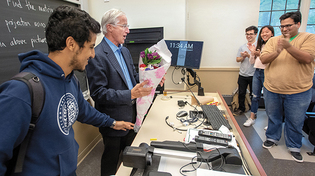 loading
loading
Light & VerityA Nobel Prize for counting the cost of carbonWilliam Nordhaus ’63 is the newest laureate in economics.  Mara LavittEconomics professor William Nordhaus ’63 got applause and flowers from students in his Intermediate Macroeconomics class on the day it was announced that he had won the Nobel Prize. View full imageMost Nobel Prize contenders are on high alert this time of year for the fabled early-morning call from Stockholm. But at a press conference held at Yale on the day his Nobel was announced, Sterling Professor of Economics William Nordhaus ’63 said he’d slept through the call. “At seven o’clock I got a call from my daughter, who said, ‘It’s so nice!’ And I said, ‘What is that?’” Nordhaus told a packed classroom in Evans Hall. “And that’s how I heard.” Nordhaus’s day only got more interesting from there, as media descended on the campus to cover someone who had not only won the Nobel Prize in Economics, but who had also been chosen because of work on one of the most important and controversial issues of our time: climate change. He shares the prize with NYU economist Paul Romer, who was cited for his work on government incentive and technological innovation. Beginning in the 1970s, Nordhaus has developed models that take into account the economic costs of climate change, making it possible to propose interventions to lessen its effects. His best-known policy prescription is the idea of a carbon tax—levying financial charges on carbon emissions. The idea has been put into practice, to varying degrees, by governments around the world, and some companies and institutions have established internal carbon charges. At Yale, Nordhaus chaired a task force that recommended Yale establish a carbon charge for units of the university, an initiative that was fully implemented last year. The announcement of Nordhaus’s prize came on the very day that a United Nations science panel released a landmark report warning of dire consequences from climate change as soon as 2040. During the Yale press conference, a reporter asked Nordhaus if he thought remedial action was still possible in the face of resistance from the current American government. “I think it’s a case of two steps forward, one step back,” he said. “This administration won’t last forever, and I think it’s really anomalous in the United States—this degree of hostility to environmental policy and climate-change policy. All I can do is hope that we’ll get through this without too much damage.” As for policy solutions, Nordhaus reiterated his long-held view that “there basically is no alternative to a market solution.” For people, corporations, and governments to take action, he said, “they’re going to have to have incentives. And the kinds of incentives we’re talking about, they’re not speeches—we can sermonize all day—but the incentives of market prizes: to raise the prices of goods and services that are carbon-intensive and to lower the ones that are less carbon-intensive.” Several speakers at the press conference noted Nordhaus’s commitment to teaching and his popularity with students. “In the last 20 years,” said Faculty of Arts and Sciences dean Tamar Gendler ’87, “Bill has taught 74 courses, touching the lives of 3,799 students.” Students in his intermediate macroeconomics class applauded and gave him flowers on the day of the announcement. “He delayed this press conference so that he could teach his seminar,” said President Peter Salovey ’86PhD. “He just didn’t want to cancel class. And if you don’t cancel it on the day you win the Nobel Prize, you’re never going to cancel it.” Since joining the Yale faculty as an assistant professor in 1967, after completing his PhD at MIT, Nordhaus has served the university in a number of ways. He was provost from 1986 to 1988, and he currently serves as chair of the Faculty of Arts and Sciences Senate. He was named a Sterling Professor—Yale’s highest faculty honor—in 2001, and he has a faculty appointment in the School of Forestry and Environmental Sciences. Nordhaus was keen to point out that Yale had a role in his accomplishments. “I think one of the things that is underappreciated is the role of great institutions in providing the support for doing the kind of work that this prize recognizes,” he said. “So I would like to throw back on Yale whatever congratulations you’ve given me.”
The comment period has expired.
|
|